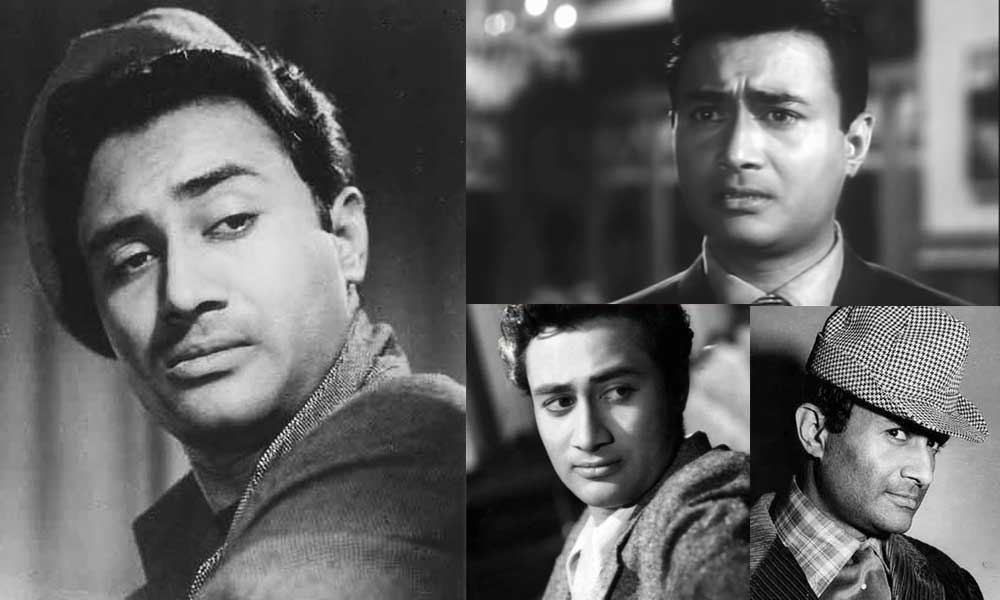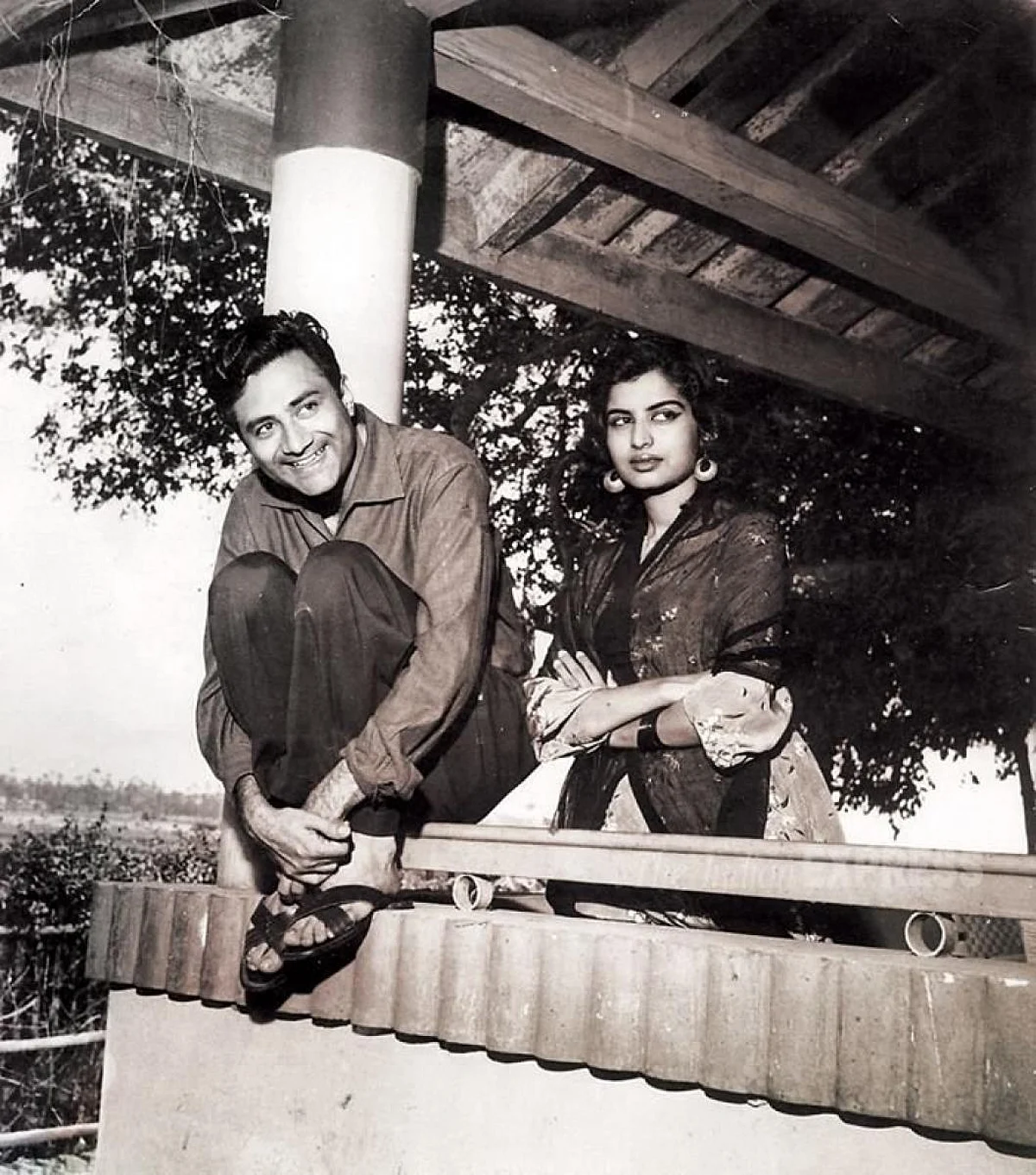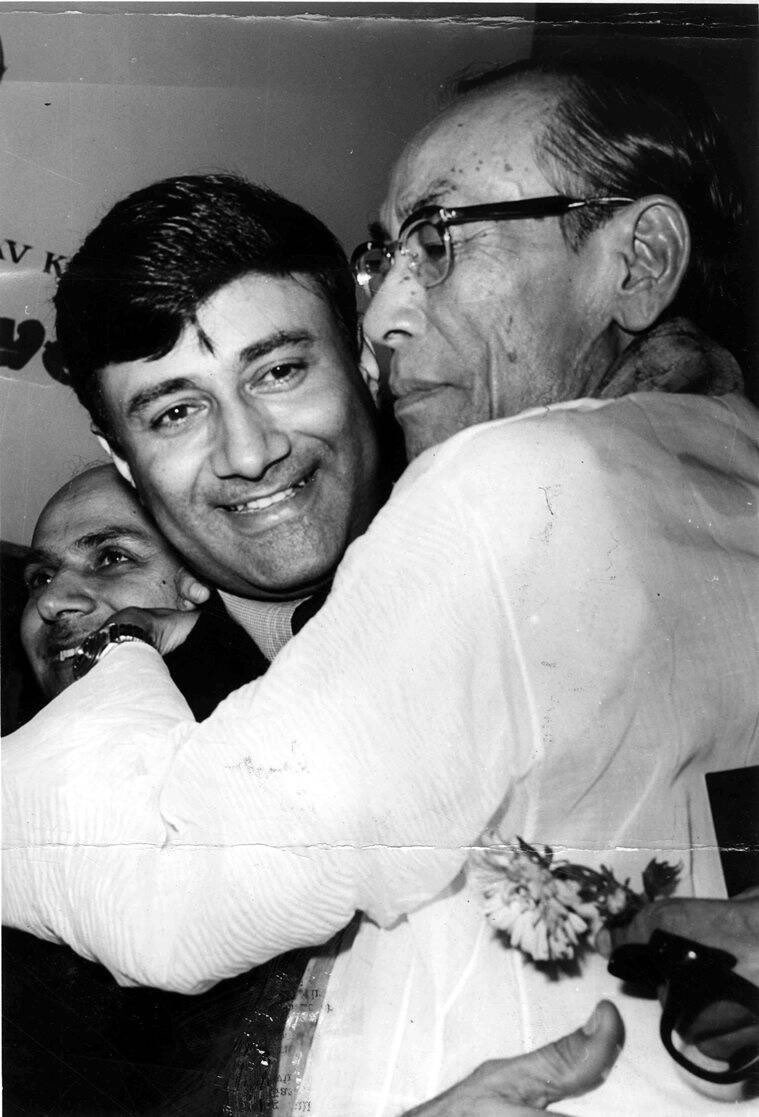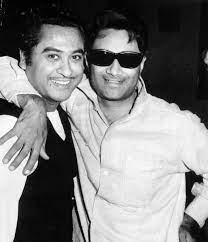Today, September 26, 2023, is the Birth centenary of an evergreen Hindi film actor who has been and will remain a perennial favorite.
I’ll give you 3 guesses if ‘evergreen’ hasn’t already got you there!
He’s synonymous with youthfulness, exuberance, a never-say-die spirit and irresistible charm.
He’s known for his rapid fire dialogue delivery, his loose-limbed swagger and his gap-toothed grin that charmed the ladies not just off-screen but on-screen as well.
His persona and his attitude to life can be summed up in these immortal lyrics from an immortal song:
(PS > This song was written about him & for him and you cannot convince me otherwise)
Barbadiyon ka sog manana fizool tha
Barbadiyon ka jashn manata chala gaya
Jo mil gaya usiko muqaddar samajh liya
jo kho gaya main usko bhulata chala gaya
gham aur khushi mein fark na mehsoos ho jahan
main dil ko uss muqaam pe laata chala gaya
main zindagi ka saath nibhata chala gaya
har fikr ko dhuein mein udata chala gaya
This one is the clincher, right?
Yep, I'm talking of none other than the
dashing, debonair, dapper
Dev Anand!!!




Alright, I’ve been waiting forever to do a tribute post on Dev Anand and I finally have the perfect occasion for it!
Why have I been waiting? Because, well, he's just been a celluloid favorite!
Against all odds, logic and reason. Against the tide of popular culture. Despite being mocked, teased and sneered at by peers. Despite the fact that there was Rajesh Khanna, Amitabh Bachchan, Dharmendra, Shashi Kapoor and their ilk to swoon over.
By the time I was in college, I had watched all of his Shwet-Shyam movies - even the forgettable ones from the 1950s.
I’ve tried many times to explain what drew me to him, but haven’t been able to pinpoint it.
He wasn't the greatest actor from that era; his peers like Raj Kapoor and Dilip Kumar were leagues ahead.
He did not pack a punch nor did he have the physique to do so - that actually wasn't a requirement those days - and his efforts at hitting the bad guy looked more like a feeble exercise in fly-swatting.
His efforts at dancing - if you could call it that, I would label it as swaying to music - were, umm, quite dismal, so it’s a good thing male actors weren’t required to do much of that either!
Nonetheless, I maintain that he was more than just a pretty face.
Because have you seen him ooze that natural charm that his heroines or the countless female fans he had, found irresistible? Just watch Madhubala lowering her eyes breathlessly when he flirts with her in Kala Pani, or Sadhana's telltale blushes when he pleads with her not to leave yet in Hum Dono, or Nutan's reluctant smile when he adorably apologizes for his transgressions in Tere ghar ke saamne.
But even with his good looks and charm or his 1000-megawatt smile, I think that it was his indomitable spirit, his self-confidence and his inner conviction in whatever he was doing that shone through on screen and captured billions of hearts. His script sense may have gone awry in his later years and his movies & characters might have devolved into self-indulgent caricatures but his heart was always fully into filmmaking right until the end.
Shekhar Kapur, his nephew, has talked about how the failure of Ishq Ishq Ishq crushed Dev Anand for all of 10 minutes and then he was over it and onto the next thing.
Barbadiyon ka sog manana fizool tha after all! (it is pointless to grieve your failures).
His real life affair with singer-actress Suraiya was much the same.

She was a singing star and he was a newcomer when they met, he was quite in awe of her. Then he saved her from drowning during a shoot, and that was it. They fell in love. It seemed like a storybook romance. He would call her ‘Nosey’ and she would call him ‘Steve’, the hero of a novel he had gifted her. She would also call him ‘Devina’ (telling that he named his daughter Devina), and he would call her ‘Suraiyana’ in a fake Italian accent. They would meet on set, and then friends would help pass love letters between them. Dev Anand modeled himself on Suraiya’s Hollywood crush, Gregory Peck & it is hard to miss the similarity, though Dev would later be irked when asked about it.
He got her an engagement ring that her grandmother supposedly threw into the ocean. Suraiya bowed down to the diktats of her conservative family and refused to marry him. She remained a spinster all her life. Dev was heart-broken and cried on his brother’s shoulder bitterly but then… he shook himself and moved on. He would later say she was too 'timid' to go against the tide.
He met and married his wife, Mona Singh (screen name Kalpana Kartik) a couple of years later.

He has confessed to being a sentimental, emotional person but his resilience has never been in doubt - to the extent that it could be labeled 'foolish optimism'.
He has openly spoken about crying at the drop of a hat on several occasions, but that did not mean he was weak-willed. He was anything but.



Born Dharamdev Pishorimal Anand in Gurdaspur in Punjab on September 26, 1923, Dev was the third of four brothers. His father was an advocate and his oldest brother also became one and his second oldest brother, Chetan began as one prior to finding his calling as a notable filmmaker.
Dev completed his BA in English literature from Government College, Lahore after which he wanted to go abroad to study further, but the family did not have the funds to sponsor his education after his two older brothers. So Dev had to settle for a job.
But he was never one to settle, so he upped and caught a train to Bombay. He began working in the military censor’s office during World War 2 and later found a job as a clerk. But again, he felt like he was settling and that restlessness would not leave him.
Dev has spoken candidly in an interview with Simi Garewal about how close he was to his mother and how her illness and subsequent passing affected him. He also spoke of how someone in Amritsar commented on how he would one day be the most successful of all his brothers. He believed it was his mother’s blessings on her deathbed that enabled that success. He was the only one of her children to be at her bedside constantly, nursing her through her sickness. Her death shattered him and he said it broke something inside him.
Though her blessings would have played a role, it was Dev’s self-confidence that allowed him to gate-crash Prabhat Film Studios office and ask for a job. The owner, Babu Rao Pai was so impressed by his smile and his confidence that he gave him a job in his film, Hum ek hain (1946) which was to be shot in Pune.
It was there that he met & befriended Guru Dutt in the famous laundry exchange incident (their shirts got exchanged in the laundry and they ended up wearing the other’s shirt), and they made a promise to help each other out - Dev would give Guru Dutt a break as director if he became successful as a hero, and Guru Dutt would cast Dev in his film if he ever turned producer. They both fulfilled their promise with Baazi (1951) and C.I.D. (1956) respectively.

When asked what prompted him to become an actor, Dev just smiled that crooked smile of his and without an ounce of ego or vanity said, “I looked in the mirror, and must have seen something there that told me I could be an actor.”
After his first few films did not do so well, Dev found himself looking for a job yet again and he befriended writer, Ismat Chugtai who brought him to Bombay Talkies to meet Ashok Kumar, who was a huge star then and an actor that Dev had watched and admired tremendously in movies like Kismet and Achut Kanya. Ashok Kumar took one look at Dev and cast him in his next production, Ziddi (1948). He would later play a lead role in one of Dev's most iconic films, Jewel Thief.
Ziddi was a huge hit and Dev was established as a star. The movie was also the beginning of his friendship and life-long association with a singer whom Dev has always been partial to as his voice of choice for him - Kishore Kumar. Perhaps because they were both middle brothers in the family. Perhaps because they were both struggling to find a footing in the industry. Or perhaps because they were both blessed with the musical gene, even if Dev wasn’t a singer his innate musical sense is what made his songs so enduring.
That bond once forged remained for years. Dev Anand would be the only actor Kishore Kumar play-backed for in the 50s and 60s and Dev always maintained that Kishore Kumar would keep him in mind while singing his songs. He would form a similar long-lasting association with S.D. Burman who composed music for all Navketan movies until ill health took over and so did his son, R.D. Burman.





He launched his own production banner, Navketan in 1949 and then in 1951 came Baazi, a crime noir movie, the first of its kind in India, helmed by Guru Dutt and written by Balraj Sahni that became an instant success, setting the trend for a whole new genre called Bombay noir with a morally ambiguous hero, a vamp with a heart of gold and shadow lighting, a technique that Guru Dutt adapted into his movies and became famous for.
Then came a spate of successful films- Taxi Driver, Jaal, Munimji, Funtoosh, Paying Guest, C.I.D, Nau do gyarah & Solva Saal- that saw him opposite Waheeda Rehman creating one of Hindi Films’ most enduring and well-loved pairings. They went on to make Kala Bazaar, Baat ek raat ki, Roop ki Rani, Choron ka Raja, Prem Pujari and the evergreen classic, Guide together.
Waheeda Rehman has spoken of her long-standing friendship with Dev and how he would insist on her calling him by first name only even though he was an established star and she was just an upcoming actress. He insisted on having her in Guide stating “only Waheeda can be my Rosie,” going against Goldie’s first choice, Vyjayanthimala. And thank God he did, because much as I love Vyjayanthimala, I cannot imagine anyone else other than Waheeda as Rosie.

He kept going in the 70s and 80s, playing leading man roles with younger heroines, and was responsible for launching the careers of many actors who went on to become stars: Zeenat Aman, Shatrughan Sinha, Tabu, Tina Munim and making some landmark hits like Hare Rama Hare Krishna, & Johnny mera naam and some thought-provoking somber ones like Tere mere sapne, but his films did become increasingly self-indulgent and forgettable. But the image of his boundless energy and youthful spirit is an enduring one, so much so that it’s hard to believe that he’s gone.
But I digress. We’re here to talk about his life and celebrate his youthful spirit.



Despite his public image as a lover-boy, Dev Anand was known as an affable gentleman, a fact affirmed by not just the journalists that met him but also his leading women.
Waheeda Rehman referred to him as a “decent flirt” and said she never felt unsafe around him. Asha Parekh said working with him was akin to being on an express train. Vyjayanthimala has called him well-read and cultured and has confessed that his boundless energy was what kept her going while shooting ‘Hoton pe aisi baat”, a song that required inhuman amounts of stamina.
Which brings us to his songs.
Gosh! His songs!
They’re probably the most melodious, most popular and most remembered ever from that era! That he had a sharp musical acumen was well-known and that was proven when he hired S.D. Burman as the in-house music director for Navketan. Almost all Navketan films had music by Burmanda and later the baton passed on to his son, Pancham.
Who can forget ‘Khoya khoya chand’, a song that keeps pace with his own jaunty sprinting across hills and plains, his energy never letting up once?
Or ‘Jiya oh jiya’ where he jumps off a train to land atop a car, persuading his lady (Asha Parekh) to confess that she loves him too?
Or ‘Mana janab ne pukara nahi’ where you are somehow able to overlook him stalking a chagrined Nutan on a bicycle and focus instead on that adorable, gap-toothed smile?
Or when he sings ‘Hai apna dil to awara, na jane kis pe aayega’, thousands of women across the country would hope they would be the lucky one?
I have heard that anecdote about a court order deeming it illegal for Dev Anand to appear in public in a black suit because of how lethal he would look in it and cause women to scream, faint or riot.
And not just women. Even men ate up his innate style & tried to copy the Dev Anand trademark mannerisms - that the man himself modestly laughed off saying that was just him being him - as exaggerated and dated as they may seem to us now. But despite the over-the-top gestures, his underlying sincerity is what hooked the audiences and had them coming for more.
In the Classic Legends episode on Dev Anand, Javed Akhtar talks about how he would be the fashion trendsetter across the nation, be it his high collared shirts, his colourful scarves or stylish hats.
But his appeal lay in not just his on-screen demeanour, but also in the way his characters were etched. He usually played smart, urban, suave, erudite characters, much like his offscreen persona. Even when he was playing rough, shady, or morally grey characters, he infused them with his inherent style, panache, and gentility. You could see glimpses of Dev Anand, the man in Anand (Hum Dono) or Raju (Guide) or Madan (Baazi) or Shekhar (C.I.D.) or Karan (Kala Pani) or Tony (Jaal).
Can you picture Dev Anand playing a dhoti- clad illiterate villager? I think his personality wouldn't allow it. Neither would it allow him to stop. No matter what the critics said or the public said. The man was so generous in accepting his failures too. He said when Censor failed that he understood why the public rejected his film - because they couldn’t relate to the theme.



The man who had once said, “Life is too short. I don’t have the time to speak slowly”, was also a self-proclaimed loner.
Which brings to mind another of his songs:
Akela hoon main, iss duniya mein, koi saathi hai toh mera saaya (I’m all alone in this world with only my shadow for a companion).
However, being a loner did not mean he was lonely. He just preferred the company of his own thoughts and ideas over anyone else… because, lets’ face it, the rest of the world just could not keep up.
I can keep going, but I’ll end my tribute with the lyrics to another song that seemed to encapsulate the man he was…
Hum hain raahi pyaar ke, humse kuchh na boliye
Jo bhi pyaar se mila hum usike ho liye
Dhoop thi naseeb mein toh dhoop mein liya hai dum
chandni mili toh hum, chandni me so liye
Dil pe aasra kiye, hum toh bas yoonhi jiye
ek kadam pe hans liye, ek kadam pe ro liye…
Happy Centenary, Dev! 
I know you're charming the hearts of all the Angels in Heaven right now!



The next posts will have some of his not-so-popular solo songs (because the popular ones will get posted anyway), and try and limit it to one song per singer/ music director combination, followed by some of his duets, each with different leading lady from the Golden Era.
I will be sticking to mostly shwet-shyam poofy-haired Dev Anand because that’s the image of his I like best, but you are welcome to post his songs from any era, the songs can have him lip-syncing or just on screen (there are plenty of those!).
Also look forward to reading facts, trivia, tributes and his interviews.
Tell us why you like Dev Anand.
Also please vote in our song polls here:
Dev Anand Rafi solo (Poll # 1)








comment:
p_commentcount